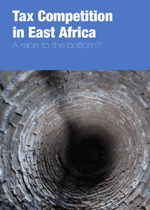East Africa: Another track of the race to the bottom in corporate taxation
Published on Thu, 2012-05-03 09:59
Four members of the East African Community (EAC) are losing $2.8 billion each year for providing corporations with tax incentives that are anyway useless to attract foreign investments, according to a report issued by the Tax Justice Network-Africa and ActionAid. This trend is “depriving countries of critical resources needed for reducing poverty” and “dependence on foreign aid,” reads the study, focused on Kenya, Uganda, Tanzania and Rwanda and titled “Tax competition in East Africa: A race to the bottom?” In Uganda, by example, “the revenue losses amount to nearly twice” the national “entire health budget in 2008/09 – a serious situation when […] a quarter of the country’s 34 million population lives in poverty (less than US$1.25 a day),” warns another report produced by the same organizations but centered on that country. The East African study was known while the European Parliament stated on April 19 that “clear EU [European Union] rules are needed to prevent such forms of tax competition which undermine the recovery strategies of the countries concerned.” In another resolution that amends the European Commission proposal on a Common Consolidated Corporate Tax Base, the legislative body warned the same day that “certain […] forms of tax competition, tax optimization and tax arbitrage could erode some Member States' revenues and create distortions.” “The tax policy of Europe is now that of the Tax Justice Network [TJN]. It’s an extraordinary achievement,” wrote on his blog Richard Murphy, senior adviser of TJN and one of the founders of this international coalition of civil society organizations. TJN defines tax competition as “the process by which jurisdictions use fiscal incentives (such as tax breaks and subsidies) to attract investment. It can involve whole countries ‘competing’ against each other, but it can also happen between states in a federation, such as inside the United States or Switzerland, or even between cities.” “Weaker states such those in Africa are far less able to cope with the external pressures of tax competition, resulting in a lower revenue base, greater inequality, greater dependence on foreign aid, and weaker accountability of government as a result of the shifting tax burden,” explains the network in its web site. “Governments […] have often participated in a global tax race to the bottom, particularly with regard to corporate taxation,” stated the Civil Society Reflection Group on Global Development Perspectives in a chapter of the Social Watch Report 2012. “They have given preference to indirect taxes, like an undifferentiated value-added tax, which have regressive effects and have increased inequalities,” added the Group, comprised of members of Social Watch, Friedrich Ebert Stiftung, terre des hommes, Third World Network, Dag Hammarskjöld Foundation, DAWN and the Global Policy Forum. In an open letter to all governments, some 50 civil society organizations from all over the world proposed last year the creation of an Intergovernmental Commission on International Cooperation on Tax Matters to protect nations from abusive practices, including evasion and the race to the bottom in corporate taxation. The claim was headed by TJN and the international networks of development groups Eurodad, CIDSE, ActionAid and Christian Aid. Tax incentives only benefit “large corporations” At the launching of the East African reports in Kampala last month, Sophie Kyagulanyi, Actionaid Uganda’s Governance Coordinator, said that “the ‘race to the bottom’ is the current tendency by our leaders to slash tax rates and ease regulatory requirements for foreign investors as a means to attract large companies to do business in the region.” “The poor are the ones bearing the biggest burden of these tax incentives because revenue for public services is reduced. The only ones benefiting from ‘tax competition’ are large corporations,” she added. The regional study recalls that Burundi, Kenya, Rwanda, Tanzania and Uganda complete their integration in a duty-free trade area with a common external tariff between 2005 and 2009. With the creation of “a larger regional market,” companies have since then the possibility to “be located in any EAC country to service this market. At the same time, however, countries are being tempted to increase investment incentives in order to attract FDI [foreign direct investments] and, they believe, increase jobs and exports,” explains the regional report. “Countries in East Africa provide a wide range of tax incentives, many of which are intended to attract foreign companies to invest. The most prominent ones are 10-year corporate income tax holidays, generous capital investment deductions, and exemptions from VAT payments, import duties and withholding taxes,” adds the study. “The main beneficiaries are foreign investors, and that the principal losers – due to substantial revenue losses – are the general population and the country as a whole.” Those policies have already “encouraged illicit trade, complicated operational systems for companies wishing to carry on business throughout the EAC, and slowed down the integration process.” They also threaten to lead the region to an “increasing tax competition and a ‘race to the bottom’” that make it harder to counter the lowering of rates and revenues. In Tanzania, revenue losses from all tax exemptions and incentives related with trade and foreign investment amounted to 6% of the GDP in 2008; in Kenya, to around 3.1% annually; in Uganda, to “at least 2%” in 2009/10; and in Rwanda, to 4.7% of GDP in 2009, according to the report. The study urged the national authorities to “undertake a review, to be made public, of all tax incentives with a view to reducing or removing many of them, especially those that involve the exercise of discretionary powers by ministers” and “a publicly available tax expenditure analysis, showing annual figures” on the costs of the benefits and identifying the beneficiaries. The governments must also “promote coordination in the EAC to address harmful tax competition” and “to eliminate excessive tax incentives,” ensuring “greater transparency for any that remains”. This report is based on data from the following sources:
|
SUSCRIBE TO OUR NEWSLETTER



